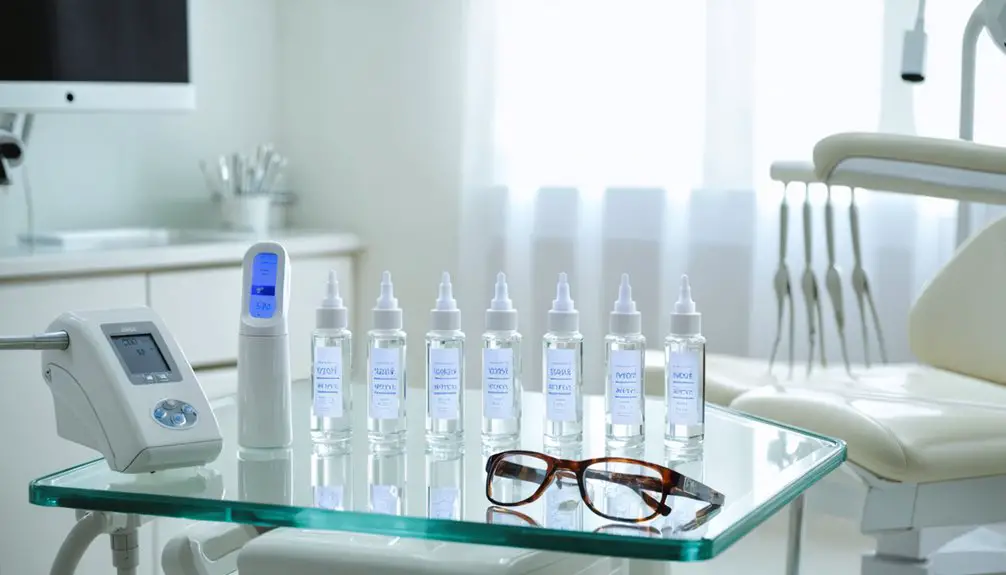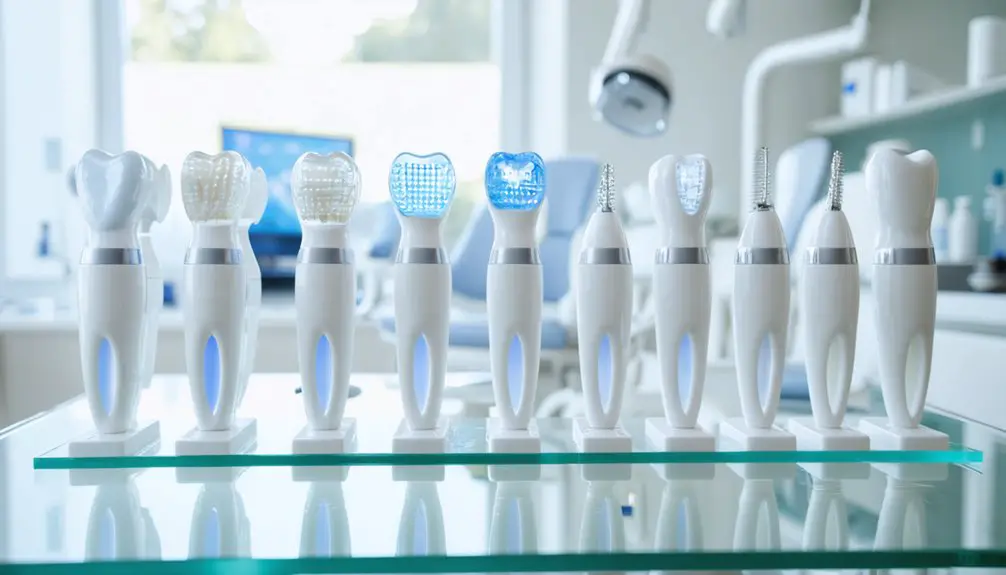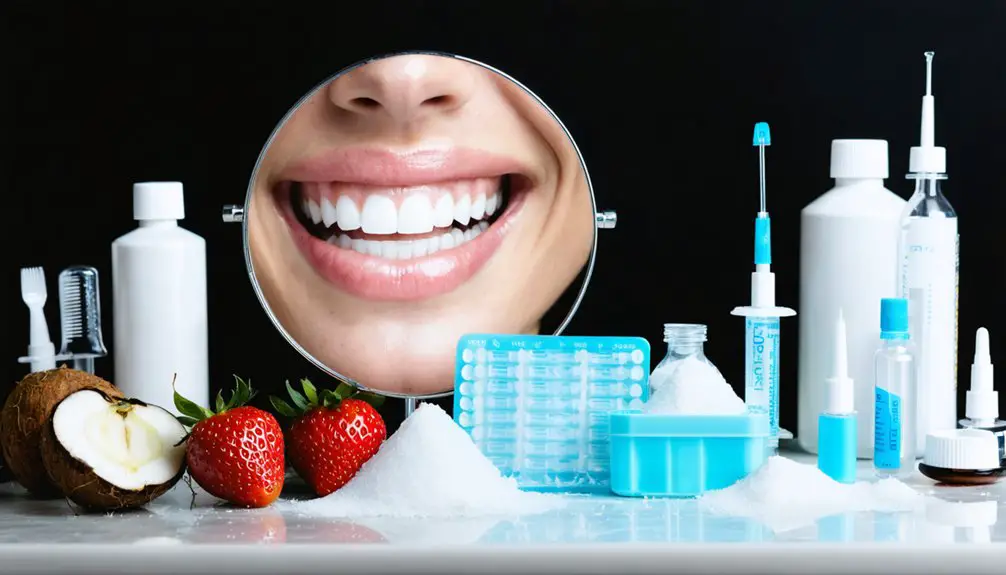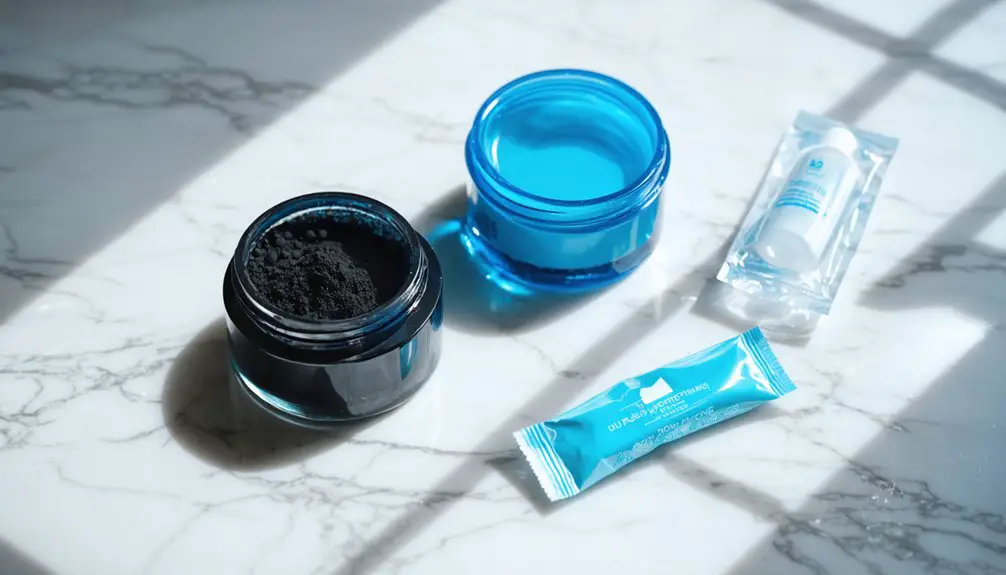You’ll typically spend between $300 to $1,500 per laser teeth whitening session, with costs varying by location and provider. Professional treatments can lighten teeth by 5-8 shades in one hour, lasting 6 months to 3 years. Additional expenses include consultations ($50-$200), pre-treatment cleanings ($75-$200), and maintenance sessions. While dental insurance rarely covers cosmetic whitening, package deals and financing options can help manage your investment. Our detailed breakdown reveals essential strategies for maximizing value.
Key Takeaways
- Professional laser teeth whitening costs range from $300-$1,500 per session, with higher prices in urban areas like Manhattan.
- Save money by looking for package deals that bundle whitening with routine dental services like cleanings and exams.
- Consider initial consultation fees ($50-$200) and pre-treatment costs like professional cleaning ($75-$200) when budgeting.
- Plan for maintenance costs with touch-up treatments needed every 6-12 months to maintain results.
- Explore financing options through dental offices or use HSA/FSA accounts for eligible whitening procedures.
Understanding the Real Costs of Laser Teeth Whitening
While laser teeth whitening offers dramatic results, understanding its true costs requires examining multiple factors beyond the base price.
You’ll typically find costs ranging from $300 to $1,500 per session, with variations based on your location and chosen clinic. Recent whitening technology advancements have improved treatment efficiency, though they’ve contributed to higher costs at premium facilities. Package deals may offer significant savings compared to booking individual treatments. Quality dentists often use trusted brands like Zoom or Opalescence for optimal outcomes.
When evaluating expenses, consider that urban practices charge more due to overhead, while patient satisfaction trends correlate with extensive packages including consultations, cleanings, and follow-up care.
You’ll need to account for potential hidden fees, as insurance doesn’t cover this cosmetic procedure. The investment delivers faster results than alternatives, lightening teeth 5-8 shades in an hour, with effects lasting 6 months to 3 years depending on your habits.
Comparing Professional vs. Over-the-Counter Options
While you’ll find laser teeth whitening costs notably more than over-the-counter options ($400-$1,000 vs. $5-$55), the professional treatment delivers dramatically better results with teeth becoming 5-8 shades lighter in a single hour-long session. Custom-made bleaching trays with high concentration gels are often provided for touch-up treatments at home.
The professional supervision during laser whitening guarantees proper application of stronger peroxide gels and reduces risks like gum irritation or uneven whitening that can occur with DIY methods. Most dental insurance plans consider this a cosmetic procedure and typically won’t provide coverage.
When you consider that professional results can last 6 months to 3 years compared to the frequent reapplication needed for OTC products, the higher initial investment often provides better long-term value.
Price vs. Results Analysis
When comparing professional laser teeth whitening to over-the-counter alternatives, the price differential reflects significant variations in both results and treatment efficiency.
You’ll find laser effectiveness ranges from 5 to 8 shades lighter in a single hour-long session, justifying the $400-$1,500 investment. Treatment duration extends from 6 months to 3 years with professional care.
In contrast, OTC products ($3-$60) offer more modest results over longer periods. A thorough dental cleaning is often recommended before any whitening treatment to ensure optimal results. While they’re budget-friendly, they contain lower concentrations of whitening agents and require consistent, extended use. Most dental insurance plans will not cover these treatments since they are considered cosmetic procedures.
Professional treatments, though costlier upfront, deliver predictable outcomes under expert supervision. When calculating value, consider that professional whitening reduces risks of sensitivity and provides more reliable, lasting results than DIY alternatives.
Safety and Risk Factors
Although both professional and over-the-counter teeth whitening methods carry inherent risks, their safety profiles differ markedly regarding supervision and control.
Professional treatments excel in sensitivity management through careful monitoring of peroxide concentrations and exposure times, while OTC products lack this customized approach.
You’ll find superior enamel protection with professional laser whitening when proper protocols are followed.
While 40-50% of patients may experience temporary tooth sensitivity, professional supervision helps minimize these effects.
If you have existing dental work or oral health conditions, professional evaluation becomes essential, as whitening won’t affect restorations and could exacerbate untreated issues.
For best safety, avoid high-powered DIY light-activation systems, which can increase pulpal temperatures and sensitivity without professional oversight.
Treatments using 10% carbamide peroxide demonstrate significantly lower sensitivity issues compared to higher concentration options.
Instead, rely on dental professionals who can adjust treatments based on your specific needs.
Custom-fitted trays provided by dental professionals help prevent gum irritation by keeping whitening agents away from sensitive tissue.
Long-Term Value Assessment
Considering the substantial difference in initial costs between professional and over-the-counter whitening options, a thorough value assessment reveals professional treatments‘ superior long-term benefits.
While OTC products cost $20-$50 per kit, you’ll need multiple treatments throughout the year, as results only last 3-6 months. Many dental professionals in major urban areas offer competitive pricing to attract new patients.
Professional treatments, though initially more expensive at $500-$1,000, deliver 4-8 shades of improvement lasting 2-3 years. This enhanced treatment effectiveness translates to greater long-term satisfaction and fewer touch-ups. Many patients find relief through flexible financing options that make professional whitening more accessible.
Professional whitening’s 85-95% success rate, compared to OTC’s 40%, means you’re more likely to achieve your desired results the first time.
When factoring in the frequency of retreatment and consistent results, professional options prove more cost-effective despite higher upfront costs.
Hidden Fees and Additional Services to Consider
You’ll want to factor in initial consultation and thorough exam fees, which typically aren’t included in the advertised whitening cost and can range considerably based on your provider’s expertise and location.
Since insurance providers generally classify teeth whitening as a cosmetic procedure, you’ll need to budget for all expenses as out-of-pocket costs, though some FSA/HSA accounts may offer limited coverage options.
Your investment should account for ongoing maintenance sessions needed to preserve results, including periodic touch-ups and potential sensitivity treatments that arise during the whitening process.
Consultation and Exam Costs
Understanding consultation and exam costs for laser teeth whitening involves three key financial components: initial consultation fees, examination charges, and potential hidden expenses.
You’ll find initial consultations ranging from $50 to $200, though some clinics include these in treatment packages. For consultation clarity, request itemized breakdowns upfront to avoid unexpected costs.
Pre-treatment exams often require professional cleaning ($75-$200) and possible x-rays, while exam expectations should account for your provider’s expertise level and location. Metropolitan practices typically charge higher fees, ranging from $400 to $1,500 per session.
If you’re seeking premium providers or specialized technology, you’ll encounter additional charges. Remember that follow-up appointments and post-treatment check-ups may incur separate fees, so confirm these details during your initial consultation.
Insurance Coverage Details
When exploring insurance coverage for laser teeth whitening, it’s crucial to recognize that most dental plans classify this procedure as cosmetic and typically don’t provide coverage.
You’ll need to verify specific insurance exclusions with your provider, as exceptions are rare and usually limited to cases where discoloration stems from medical conditions.
If you’re fortunate enough to have coverage, be prepared for substantial out-of-pocket expenses. Plans like Humana Bright Plus offer a $100 annual allowance, while Guardian’s Diamond plan covers 50% after a six-month waiting period.
You’ll encounter deductibles, copayments, and annual maximums that affect your final cost.
Consider dental savings plans as an alternative, which can provide 15-50% discounts at participating providers, though these aren’t insurance reimbursements but rather negotiated rate reductions.
Maintenance Sessions Over Time
Regular maintenance sessions after laser teeth whitening typically incur additional costs that extend beyond the initial treatment package.
You’ll need to plan for touch-up treatments every 6 to 12 months, with fees varying by location and practitioner expertise. These maintenance sessions often include supplementary services like sensitivity management treatments, customized take-home trays, and specialized whitening gels.
To optimize your maintenance frequency and minimize expenses, you’ll need to evaluate factors that affect color stability.
Your lifestyle habits, such as coffee consumption or smoking, can accelerate discoloration and increase the need for touch-ups.
You should also anticipate potential costs for pre-whitening dental exams, professional cleanings, and desensitizing treatments that support long-term results.
Consulting with your dentist helps create a personalized maintenance schedule that balances effectiveness with cost efficiency.
Maximizing Value Through Package Deals
To maximize the value of laser teeth whitening treatments, dental providers frequently offer extensive package deals that bundle multiple services together.
You’ll find package benefits like free whitening sessions when combined with routine dental exams and cleanings, particularly if you’re covered under a PPO insurance plan. Many promotional offers include multi-session packages at reduced per-session costs, helping you save considerably compared to individual treatment pricing.
Significant savings await through dental package deals combining laser whitening with regular checkups, especially for PPO insurance holders.
Look for transparent pricing structures that clearly outline all inclusions, from consultation to post-treatment care.
You can often secure the best value through packages that combine laser technology with regular dental maintenance, such as the $79 whitening option available after a cleaning within 4-6 months.
These bundles typically include touch-up treatments at discounted rates for sustained results.
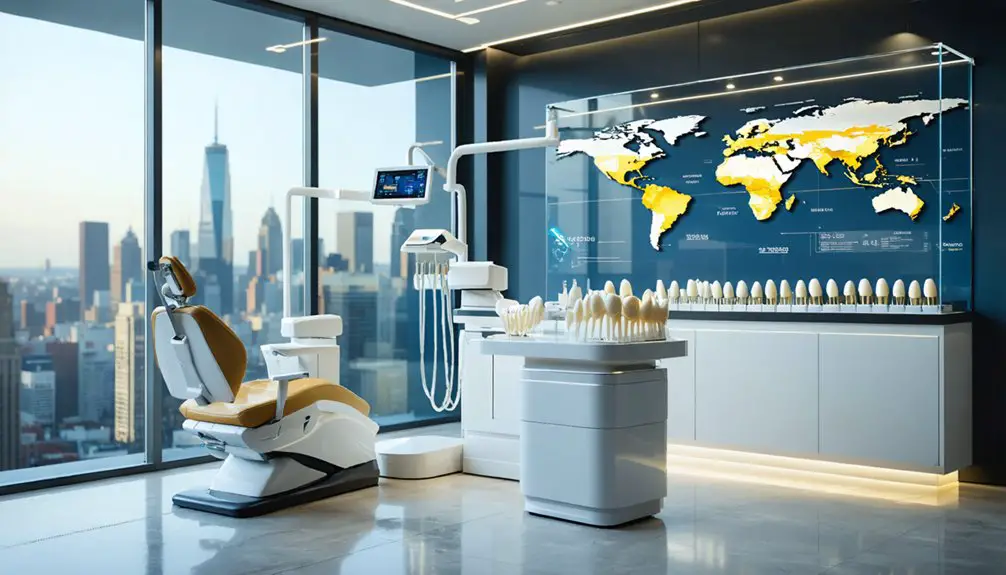
Across the United States, laser teeth whitening costs vary dramatically based on geographic location, with urban centers commanding premium prices between $400 and $1,500 per session.
You’ll find significant regional pricing differences, from Manhattan’s $179-$1,500 range to Dallas’s $1,500-$3,200 spectrum, driven by local market conditions and urban demand.
To navigate these variations effectively, you’ll want to compare itemized quotes across clinics and verify included services.
Consider traveling to nearby lower-cost areas if the savings outweigh travel expenses.
In high-cost regions, look for competitive promotions while ensuring quality isn’t compromised.
Research shows that practice overhead, dentist expertise, and advanced technology access contribute to these geographic price differences, so factor these elements into your decision-making process.
Long-Term Maintenance Costs and Strategies
While initial laser whitening costs vary by location, maintaining your results demands careful consideration of ongoing expenses.
You’ll need to budget for touch-up sessions every 6-12 months, ranging from $100-$400 per treatment. For ideal maintenance product recommendations, invest in whitening toothpaste ($3-$15), specialized mouthwash ($5-$10), and professional take-home kits ($375-$500).
Consider sensitivity management tips to protect your investment: use desensitizing products after treatments, avoid extremely hot or cold foods, and maintain regular dental check-ups ($50-$200).
To extend the longevity of your results, minimize consumption of staining substances like coffee and wine.
Professional cleanings ($100-$400) every 6-12 months will help preserve your whitening results and support overall oral health.
Smart Ways to Finance Your Teeth Whitening Treatment
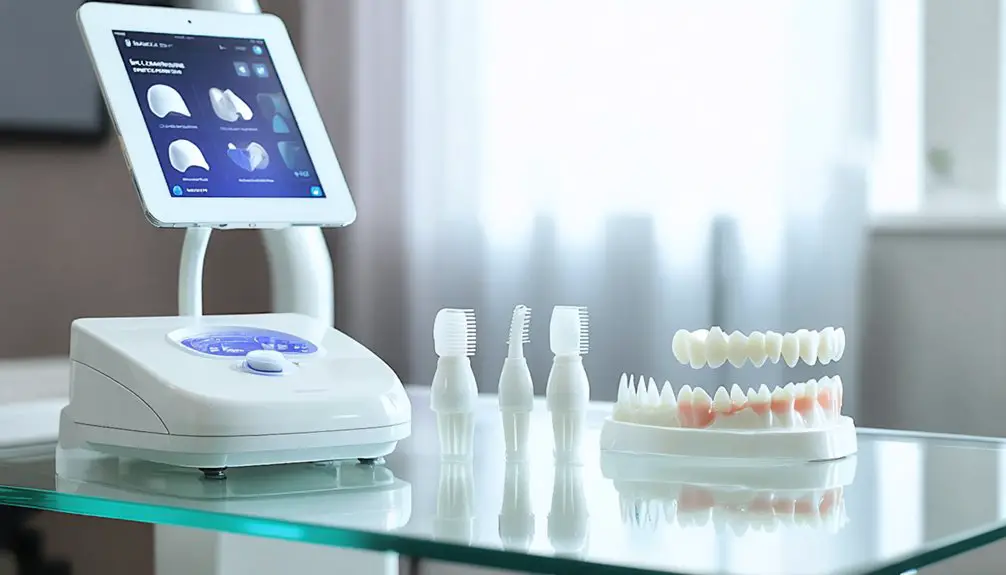
Looking for affordable ways to achieve your dream smile? Several financing options can help make laser teeth whitening more manageable for your budget.
You’ll find flexible payment plans through dental offices, third-party financing companies, and tax-advantaged accounts like HSAs and FSAs.
- Check if your HSA or FSA funds can cover whitening procedures – verify eligibility with your provider
- Explore in-house payment plans at dental offices offering low or no-interest monthly installments
- Consider third-party financing through companies like CareCredit, which may offer interest-free periods
- Bundle whitening with other dental work to potentially qualify for package discounts
- Research local dental schools that might provide discounted whitening services under professional supervision
Always verify terms, interest rates, and repayment schedules before committing to any financing option to guarantee it fits your financial situation.
Frequently Asked Questions
How Painful Is Laser Teeth Whitening Compared to Other Whitening Methods?
You’ll experience less pain with laser whitening than Zoom treatments, though your individual pain tolerance affects sensitivity levels. It causes sharper but shorter-lasting discomfort compared to gradual whitening methods.
Can Laser Teeth Whitening Damage Existing Dental Work Like Crowns?
Like a shield of steel, your crowns’ durability won’t be compromised by laser whitening. While the treatment effectively brightens natural teeth, it won’t affect or damage your existing dental work.
What Medications or Conditions Might Make Someone Ineligible for Laser Whitening?
You’re ineligible if you’re taking photosensitive medications like antibiotics, antidepressants, or blood pressure drugs. Poor dental health, active infections, pregnancy, or certain skin conditions also disqualify you from laser whitening.
How Soon After Laser Whitening Can I Safely Drink Coffee or Wine?
You’ll need to wait at least 48 hours before drinking coffee or wine post whitening. Your beverage choices should focus on clear liquids initially, as your teeth’s pores remain vulnerable to staining.
Is Laser Teeth Whitening Safe During Pregnancy or While Breastfeeding?
You shouldn’t undergo laser teeth whitening during pregnancy or breastfeeding due to safety concerns. While no conclusive evidence proves harm, pregnancy effects and potential chemical absorption pose unnecessary risks to your baby.
References
- https://www.bruinsdentist.com/understanding-how-much-to-whiten-teeth-a-complete-price-breakdown
- https://salisburydentist.co.uk/the-complete-guide-to-professional-teeth-whitening-costs-at-the-dentist-in-2025/
- https://boomcloudapps.com/how-much-does-laser-teeth-whitening-cost-how-to-save-on-dental-costs-with-and-without-insurance/
- https://www.youtube.com/watch?v=m1_9ZhrWk_g
- https://www.soladentalspa.com/blog/professional-teeth-whitening-cost
- https://maidenlanedental.com/laser-whitening-teeth-cost/
- https://212dentalcare.com/how-much-does-laser-teeth-whitening-cost-in-nyc/
- https://www.gentledental.com/resources/articles/teeth-whitening-cost
- https://www.parksmilesnyc.com/how-much-does-teeth-whitening-cost-in-manhattan/
- https://blyssdental.com/teeth-whitening-cost/
